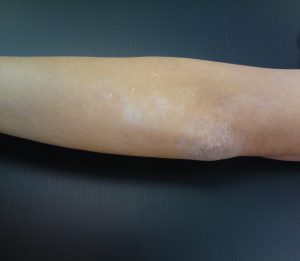Taking care of your skin
Find out how you can protect your skin and keep it healthy, even in an air-condition environment.
 Most Asians are lucky in that they look half their age compared to their Western counterparts. But don’t take this for granted. Our skin gradually thins and loses its moisture as we get older so having a healthy skincare regime will pay dividends in the long run.
Most Asians are lucky in that they look half their age compared to their Western counterparts. But don’t take this for granted. Our skin gradually thins and loses its moisture as we get older so having a healthy skincare regime will pay dividends in the long run.
Having healthy skin not only makes us feel good it is also a sign of our general well-being. But when things start to go wrong and you develop dry skin then the problem can soon escalate. If left untreated, dry skin may worsen and lead to eczema.
Dr Mark Tang (left), consultant dermatologist and director of research at the National Skin Centre, said “At the National Skin Centre, we are seeing the damaging effects of dry skin when it has been left untreated. The problem is that people don’t pick up the warning signs and often underestimate the pain dry skin can cause.”
Singapore is expected to be the world’s third-fastest ageing nation in the world – the number of those aged 65 and above will double to 20 percent by 2020. So dry skin could become an even bigger problem among this generation, if not tackled properly.
How the skin works
Let’s start by taking a look at how your skin actually works.
The outermost barrier of the skin is called the stratum corneum and acts like a brick wall. The skin’s bricks (corneocytes) keep the water trapped inside while the cement (lipids/oils) holds the bricks in place giving it a waterproof quality.
While a solid foundation of the stratum corneum is good news, its breakdown will lead to skin moisture lost, and accelerating the effects of dry skin.
There are also internal factors that can contribute to skin dryness. Conditions such as atopic eczema can be genetic. A medical condition such as diabetes or kidney failure can also cause dry skin. Such factors are often beyond our control.
MOISTURISING DOS AND DON’T’S
DOs
- Use a soap-free cleanser
- Indulge in sensible air-conditioning usage
- Use a moisturising cream or lotion when travelling to countries with temperate climate
- Moisturise immediately after your shower
- Focus on special sites such as your hands, feet and elbows
- Be discerning about moisturisers as not all moisturisers are created equally
- Consult a dermatologist if the dry skin is persistent or worsening
Dr Tang said, “Whatever the reasons behind our dry skin, the important thing is spotting the warning signs early. This could start with discomfort, pain, itchiness or stinging. If left untreated, this will lead to a rough texture of the skin, scaling and flaking. In severe cases, this may even lead to cracks and fissures in the skin.
Lifestyle plays a part
There are external factors that can contribute to dryness (or dry skin), including diverse temperatures of air conditioning and hot weather. Soaps and detergents may also be at fault.
“Failure to deal with these symptoms may lead to eczema and the National Skin Centre is seeing more of such cases,” he added. The Centre now sees 15,000 patients each year. Cases of atopic eczema in Singapore are among the highest in Southeast Asia.
Air-con nation
In a recent survey of more than 240 customers at NTUC Healthcare Unity Pharmacies, it was found that three out of four respondents complained of dry skin. But only half would act on their condition.
A total of 43 percent of people blamed the air conditioning for their dry skin. As we all know, air conditioning is a way of life in the hot and humid climate of Singapore. Other culprits are alcohol-containing soaps and sanitizers, which can dry the skin.
Moisturise daily
So get into the habit of moisturising daily. Once you do this, you will be giving your skin the very best chance to stay healthy as you age. Do make sure you do your research before you buy just any moisturiser.
Dr Tang gave some tips in selecting the right moisturiser. “The ideal moisturiser should hydrate and restore the skin barrier. While it delivers moisture into the stratum corneum (or the outermost layer of the skin), it should also help retain moisture and create a ‘zip lock’ effect,” he said, “Make sure it is allergen free and user-friendly.”
There are some moisturisers that do more harm than good to your skin; for example, if you are prone to allergies or have sensitive skin, you should choose a moisturising cream that is hypoallergenic. If you are prone to acne, look for a moisturiser that doesn’t clog pores (non-comedogenic).
So how often should one moisturise in a day? “When people ask me this question, I’ll tell them ‘10 times’ knowing that they’ll only do it a couple of times a day,” Dr Tang responded.
But the optimum number of times is down to the individual. Moisturise as often as you need to. That could be at least three to four times day if your skin is really dry. And the ideal time is after bathing or washing your hands. “At anytime, really,” Dr Tang exclaimed.
And don’t think that dry skin is just the domain of women. Men suffer from it too and very rarely apply moisturiser. Most health-conscious seniors will exercise regularly or watch their diet. So adding a healthy skincare regime should be a natural process.
COMMON MTYHS ABOUT DRY SKIN
- People exposed to wet work don’t have dry skin
- Children don’t have dry skin
- Drinking lots of water prevents dry skin
- Cosmetics don’t cause dry skin
** Special thanks to: Evelyn Quek of GolinHarris.

0 Comments